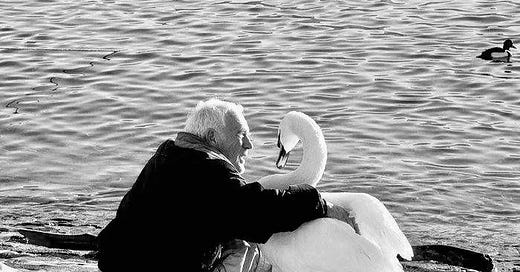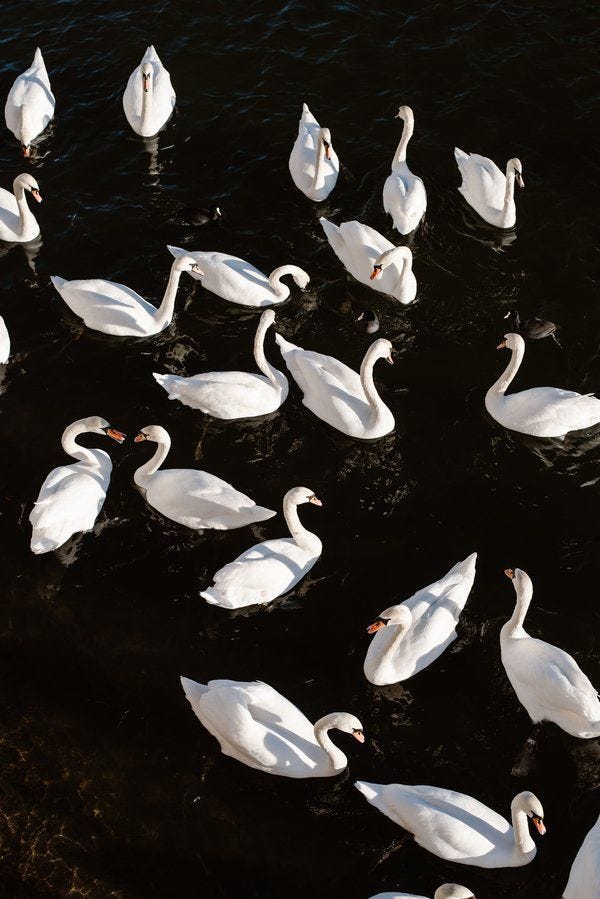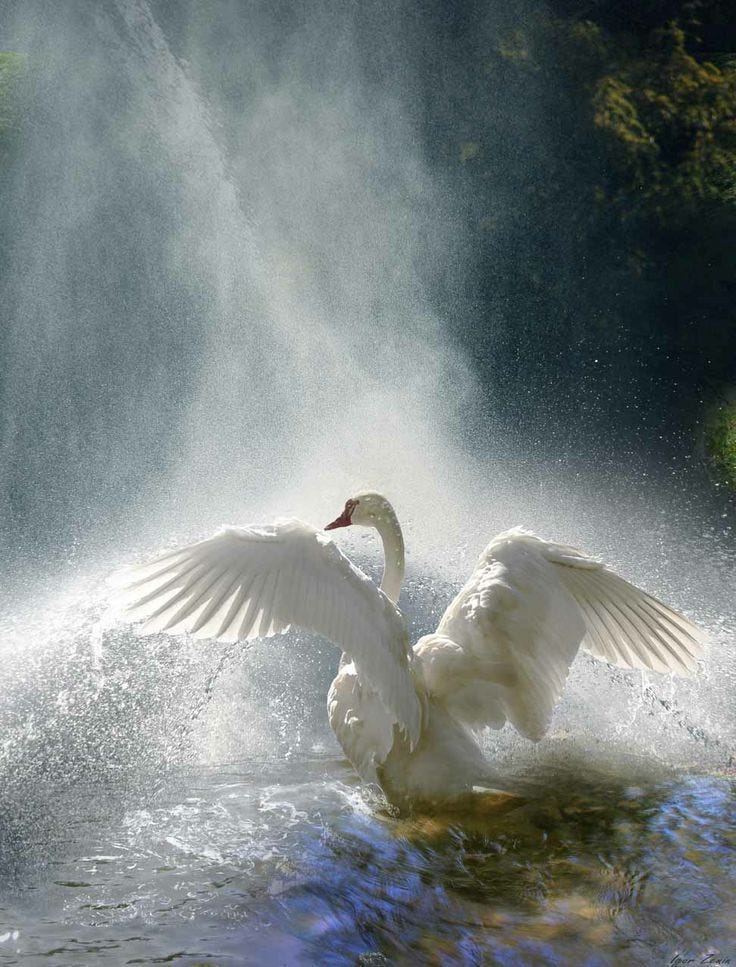dear little voice,
as a child, i wrote a poem. it was a poem about the tears of a bird. the tears spoke to the bird and said: life is miserable. why have you made me?
these days, i am grown— and while i am a little taller, i am still dreaming, putting my ear down hard and hot to the dark and hoping to lean in on the conversations between tears and their makers. but i also often find myself asking: why have you made me?
so i look for a path— because i want to know where to put my feet.
we live by this elemental impulse: to be neatly given a path, as dark and as certain as a lump of coal. it is this yearning for certainty that forms a quiet organisation of our days. we set the stage for our personal epic—a quest for certainty in a world that hardly offers directions. we declare, “i am this; therefore i can be that”— and so, like minor gods, we fashion a world, and abide by its path. in our early narratives, the world is reconstituted, not as it is, but as we need it to be—a solitary stage where even evil is reimagined as a threat only when it encroaches on our self-fashioned reality.
certainty composes the drama of our lives—a quiet, omnipresent script that tells us there’s a direct route to our truest selves. we’re led to believe that a specific formula exists, a series of measured steps that will transform us into our most content, fulfilled, complete versions. we’re advised to be resolute, to take a stand, to decide with unwavering conviction. this rigid system of belief offers the comfort of a well-worn map, a reassurance that if we continue along this predetermined road, we’ll eventually arrive at the person we’re meant to be. this assurance is an illusion. it is a neat narrative that comforts us in its simplicity; as though our only task is to enter a silhouette of ourselves preordained from birth.
but perhaps instead of a self-imposed manual for life’s messy navigation, what we need is a practical field guide to its mysteries.
why have you made me?
as the Spanish poet Antonio Machado wrote: there is no path. the path is made by walking. by walking you make the path.
baby swan by Olivier Mattelart
after all, our root word for poetry, poiesis, is derived from the Greek ποιεῖν, meaning: to make. this is the same word that gives us the biological term for the formation of what we are; of the making of our blood cells: hematopoiesis.
Heidegger referred to poiesis as a "bringing-forth,” or the creation of something from nothing. he distinguishes between two forms of bringing forth: poiesis and physis.
physis, a kind of poiesis, is a form of creation in the sense of being an emergence– or, “a creative event which first brings beings out of concealment”. physis is the flower blooming, the butterfly erupting from its cocoon, the falling of rain from a thickening cloud and the sea that feeds it.
the result of physis is inevitable and self-fulfilling. what poiesis reveals, however, is unconcealed not by itself but rather by another. poiesis is not nature at ease. it is a summoning. it is creation by way of desire, of the will— it is the maker shaping the formless into form. it is the path of the lover as much as it is of the killer. it is the first step of a child. it is music and it is sculpture and it is a life.
"bringing-forth brings out of concealment into unconcealment,” writes Heidegger. this image of making, or poiesis, leads us to another Greek verb: aletheia, meaning to reveal. it is also the Greek word for truth.
occasions of poiesis are, for this reason, threshold occasions. they exist not within but between states, at their edges, when one state of being dissolves into another.
inhabiting these spaces is, Heidegger said, a brief experience of ecstasis– or ecstasy. to inhabit a threshold is to anticipate a revelation, an abandonment of one form as it becomes something else, a liberation from an original state through a desire for what is new, though ultimately unknown.
all moments of poiesis, or becoming, involve the sacrifice of an original, untouched state still innocent of what it will become.
it is the state of making. of writing poetry, which Audre Lorde describes in Poetry is Not a Luxury as “that distillation of experience from which true poetry springs, births thought as dream births concept, as feeling births idea, as knowledge births (precedes) understanding.”
as dream births concept.
as knowledge births— and precedes— understanding.
our purpose enters us quietly, and without understanding. it enters us like language; like dreams as we sleep; it precedes our understanding of it; cannot be constructed; can only be revealed.
it is poetry.
we all carry an image in our mind of the unknown.
mine is a swan.
it has been this way since i read Rilke’s poem:
“This clumsy living that moves lumbering
as if in ropes through what is not done,
reminds us of the awkward way the swan walks.And to die, which is the letting go
of the ground we stand on and cling to every day,
is like the swan, when he nervously lets himself down
into the water, which receives him gaily
and which flows joyfully under
and after him, wave after wave,
while the swan, unmoving and marvellously calm,
is pleased to be carried, each moment more fully grown,
more like a king, further and further on.”
what Rilke is saying here is that when the swan walks awkwardly, it walks awkwardly only because it is doing so on a path that was not built for it.
the swan does not remedy its ungainly gait by hurrying, by punishing itself, or by imposing order on its movements. doing any of this would be to believe in the certainty that it is where it belongs.
instead, it brings out of concealment into unconcealment its own path: by turning toward that elemental water, where its nature can come fully into play. and this simple contact— or poiesis— is what grants the swan its grace.
in the same way, when you dare to reach out and touch the elemental waters of your own life, of who you are and what you love— everything transforms. but, you must first lower yourself from the safety of familiar ground. this, especially when you fear you might drown, is no small feat.
Swan lake, sweet afternoon light. Suhaylah H. (2016)
so this is all requires, of course, a kind of courage— and perhaps the most terrifying kind: the courage to believe in revelation, that the somethingness will come out of the nothingness. that we will glide. that if we sacrifice an original, comfortable state, truth will be the natural product of mystery and show us what we are. that if we put down our feet and walk into the unknown, they will make a path.
as David Whyte writes:
“Courage is the measure of our heartfelt participation with life, with another, with a community, a work; a future. To be courageous is not necessarily to go anywhere or do anything except to make conscious those things we already feel deeply and then to live through the unending vulnerabilities of those consequences. To be courageous is to seat our feelings deeply in the body and in the world: to live up to and into the necessities of relationships that often already exist, with things we find we already care deeply about: with a person, a future, a possibility in society, or with an unknown that begs us on and always has begged us on.
Courage is what love looks like when tested by the simple everyday necessities of being alive.
On the inside we come to know who and what and how we love and what we can do to deepen that love; only from the outside and only by looking back, does it look like courage.”
— David Whyte, Consolations
courage is knowing your footprints are the road:
traveler, your footprints are the only road, nothing else.
traveler, there is no road; you make your own path as you walk.
as you walk, you make your own road, and when you look back
you see the path you will never travel again.
traveler, there is no road;
only a ship's wake on the sea.
in Machado’s poem, real courage is the courage to abscond from certainty— or: the termination of one’s curiosity.
but i think there is another courage too, that hides quietly in these lines:
as you walk, you make your own road, and when you look back
you see the path you will never travel again.
that is to say: one day, you will turn around.
and i promise you that you will miss all this too: the confusion, the despair, the sheer mess of it all.
i promise you that.
unknown photographer.
now, thinking of the little bird in my poem all those years ago, i recall Albert Camus’ words: men must live and create. live to the point of tears.
now i look to myself and ask: life is beautiful. why have you made me?
and now i think of Rilke writing: you must change your life.
and now i feel my feet leaving the ground.
love,
ars poetica.
little voice: it is my belief that Poetry is a human birthright. it is for this reason that my work will always be completely free, but it takes considerable Time and Love to give to you each week. if it has brought you something, please consider buying me a book so that I may continue to tuck Words in your pocket:
PS- before you go, another beautiful poem about swans— again, by Mary Oliver:














This is just gorgeous and brings me, yes, to tears. Happy tears. So exquisite the reflecting - water, life, the mirror when courage pulls to look away from self-fashioned reality, and the sparkling surprise right away of Theodore Roethke's beautiful quote. After reading, I sat here for a while listening to the cello piece Carnival of the Animals - The Swan, by Camille Saint-Saëns. A perfect complement. Thank you.
reading this after my daily soul-crushing job hunting linkedin shift. i KNEW it was going to be good and comforting because i love your writing. thank you so much for sharing <3